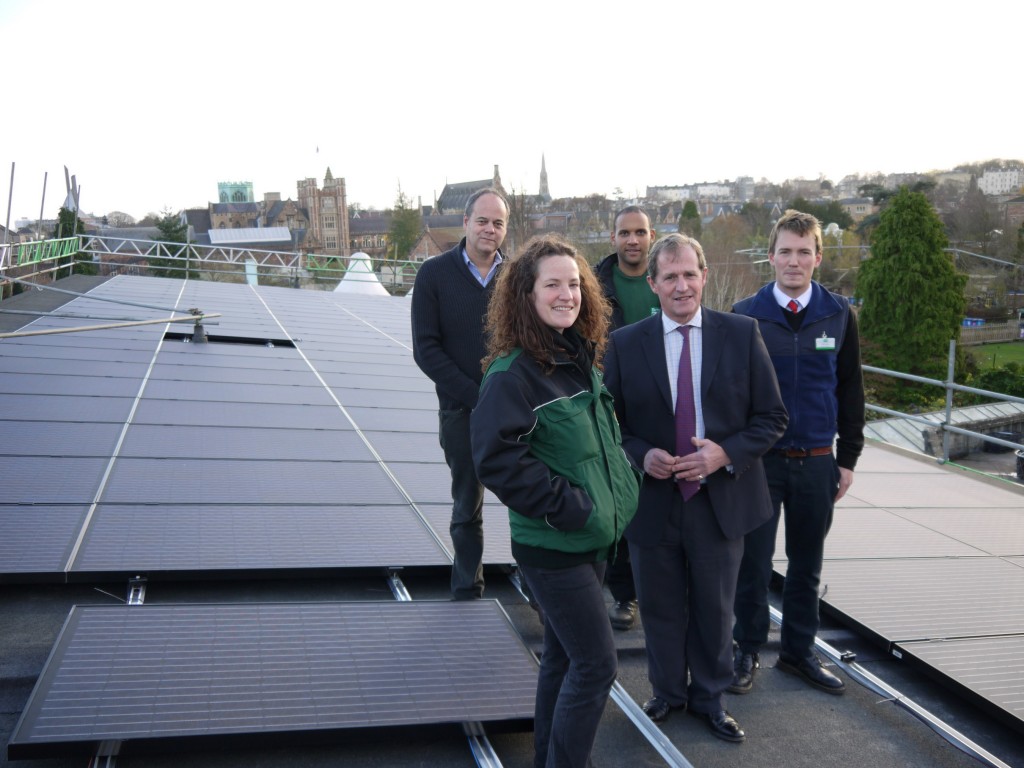 An area of roof roughly the size of a tennis court has been covered in solar panels at Bristol Zoo by Backwell company Solarsense. The 184-panel 46.92kW solar photovoltaic (PV) system, which is mounted on the roof of the zoo’s veterinary department and services building, will generate enough electricity to power the equivalent of all the pumps and lighting in the zoo’s aquarium for more than three months each year.
An area of roof roughly the size of a tennis court has been covered in solar panels at Bristol Zoo by Backwell company Solarsense. The 184-panel 46.92kW solar photovoltaic (PV) system, which is mounted on the roof of the zoo’s veterinary department and services building, will generate enough electricity to power the equivalent of all the pumps and lighting in the zoo’s aquarium for more than three months each year.
Bristol Zoo head of estates Tim Wilson said: “We had to move quickly to install the panels to ensure the system was operational ahead of a December 12 cut-off date set by the Government, to achieve maximum financial benefit from the Feed-in Tariff which pays us for the energy we generate.
“We chose Solarsense because the company has a strong track record of installing systems in high-profile historic sites, and also with large solar arrays such as the system they installed at Worthy Farm, home of the Glastonbury Festival.”
A key planning consideration of the installation was the visual impact of the panels and five different locations were considered before the roof of the vet and services building was chosen.
Special German all-black solar panels were used, and the roof modified to ensure a discrete and non-intrusive solution. The zoo has calculated that the system will pay for itself within seven years.
"These panels are more expensive than their budget equivalents but we are delighted with the result," said Mr Wilson.
"We are very keen to promote the use of renewable energy at Bristol Zoo wherever possible," he added. "We use a lot of electricity to light the indoor enclosures, operate the pumps in the aquarium and to keep dozens of heat lamps for the reptiles, for instance. We cannot turn down the thermostat to save energy, but we can be as sustainable as possible and the new system will achieve that.
"It makes environmental sense and it makes financial sense – it is a success story all round."
In addition Bristol Zoo has also recently installed a biomass boiler ready for the winter months which will reduce its wood waste and energy bills. The boiler burns waste offcuts of wood from the zoo workshop as fuel as well as FSC certified, sustainable wood pellets. The boiler now heats all the water used in the zoo’s veterinary surgery, offices, animal food preparation kitchen and maintenance workshop.
“We chose Solarsense because the company has a strong track record of installing systems in high-profile historic sites, and also with large solar arrays such as the system they installed at Worthy Farm, home of the Glastonbury Festival.”
A key planning consideration of the installation was the visual impact of the panels and five different locations were considered before the roof of the vet and services building was chosen.
Special German all-black solar panels were used, and the roof modified to ensure a discrete and non-intrusive solution. The zoo has calculated that the system will pay for itself within seven years.
"These panels are more expensive than their budget equivalents but we are delighted with the result," said Mr Wilson.
"We are very keen to promote the use of renewable energy at Bristol Zoo wherever possible," he added. "We use a lot of electricity to light the indoor enclosures, operate the pumps in the aquarium and to keep dozens of heat lamps for the reptiles, for instance. We cannot turn down the thermostat to save energy, but we can be as sustainable as possible and the new system will achieve that.
"It makes environmental sense and it makes financial sense – it is a success story all round."
In addition Bristol Zoo has also recently installed a biomass boiler ready for the winter months which will reduce its wood waste and energy bills. The boiler burns waste offcuts of wood from the zoo workshop as fuel as well as FSC certified, sustainable wood pellets. The boiler now heats all the water used in the zoo’s veterinary surgery, offices, animal food preparation kitchen and maintenance workshop.
Photo caption: Solar panels at Bristol Zoo. L-R Stephen Barrett, managing director of Solarsense; Natasha Block of Solarsense; Joe Allotey, Zoo maintenance manager; Tim Wilson, Zoo head of estates; Ben Layton Zoo project assistant.






























